Kompetenzzentrum
A Unit of the forthcoming issue 16 of the African Development Perspectives Yearbook with the theme "Macroeconomic Policy Formation in Africa" is now finalized and will consider the economic causes, the recent developments and the perspectives of the "Arab Spring" countries like Egypt and Tunisia. While the international discussion centers on political and international relations issues, the economics of the background factors to these revolutions in Arab countries is largely neglected.
IWIM joined forces with institutions in the region, like UNESCWA (United Nations Economic and Social Commission for Western Asia) in Beirut, UNDP's Regional Center in Cairo and the Arab Planning Institute in Kuwait to make this Unit possible. Research Director Magda Kandil from ECES (Egyptian Center for Economic Studies) and Professor Karl Wohlmuth, University of Bremen will introduce into the Unit. Background studies and country case studies are presented in the Unit. An analysis of the socioeconomic causes of revolutions in "Arab Spring" countries, an overview of recent developments in "Arab Spring" countries, and a strategic framework for new economic policies in "Arab Spring" countries are presented.
Other Units of this forthcoming volume of the Yearbook cover new macroeconomic policy approaches and frameworks for African countries, macroeconomic policies of low income and post-conflict countries in Africa, and macroeconomic policies in WAMZ (West African Monetary Zone) countries with special emphasis on Nigeria. Also a Book Reviews/Book Notes Unit is included.
The Yearbook Project will continue with the theme "Africa's Progress in Regional and Global Economic Integration" as Volume 17 for 2014 (Link to the Project Website: http://www.iwim.uni-bremen.de/africa/about.htm and link to the website with the description of the past volumes: http://www.iwim.uni-bremen.de/africa/africanyearbook.htm).
Die sozioökonomischen Grundlagen und die Folgen des "Arabischen Frühlings":
Unter diesem Thema wurden für die Unit 2 (Teil 2) des neuen Afrika-Jahrbuchs mit dem Titel "Macroeconomic Policy Formation in Africa" einige Studien verfasst, sowohl Grundlagenstudien als auch Länderstudien für Ägypten und Tunesien. Während politologische und soziologische Studien sich dem Thema der Ursachen und der Folgen des "Arabischen Frühlings" intensiv widmen, sind ökonomische Studien dazu eher rar. Diese Lücke soll mit den Studien im neuen Afrika-Jahrbuch nun geschlossen werden.
Das IWIM hat bei der Erstellung dieser Studien mit wichtigen Institutionen in der Region kooperiert, um diese Unit möglich zu machen, so mit UNESCWA (United Nations Economic and Social Commission for Western Asia) in Beirut, dem UNDP Regional Center in Cairo und dem Arab Planning Institute in Kuwait. Research Director Magda Kandil vom ECES (Egyptian Center for Economic Studies) und Professor Karl Wohlmuth, Universität Bremen führen in einem Beitrag in diese Unit ein.
Andere Units des neuen Jahrbuchs behandeln neue makroökonomische Rahmenbedingungen und Politiken für afrikanische Länder, makroökonomische Politiken in Niedrigeinkommensländern und Post-Konflikt-Ländern, und makroökonomische Politiken in WAMZ (West African Monetary Zone)-Ländern, insbesondere für Nigeria. Auch eine Book Reviews/Book Notes-Unit ist vorgesehen.
Das Jahrbuch-Projekt wird mit dem Thema "Africa's Progress in Regional and Global Economic Integration" für den Band 17 (2014) fortgesetzt (vgl. den Link zur Website des Jahrbuch-Programms: http://www.iwim.uni-bremen.de/forschung/forsch-adpy.htm und den Link zur Seite mit einer Beschreibung der bisher erschienenen Bände: http://www.iwim.uni-bremen.de/africa/africanyearbook.htm).
Evaluierung von wirtschaftswissenschaftlichen Studiengängen in Gießen: Der Bremer Professor Karl Wohlmuth nahm als Mitglied einer Gutachtergruppe an der Evaluierung/Re-Akkreditierung von Wirtschaftsstudiengängen an der Technischen Hochschule Mittelhessen in Gießen teil. Die Wirtschaftsstudiengänge an der Technischen Hochschule Mittelhessen sind in den letzten Jahren konsequent international ausgerichtet worden.
Also the book with the African Country Case Studies on Agro-industry Development which is related to the main document "Agribusiness for Africa's Prosperity" is now available as an E-Book. The Country Case Studies were conceived as background materials to the main document. The main document was published in English and in French. The three E-Books can be fully downloaded at:
http://www.unido.org/index.php?id=1001692
At this website also other information about the project can be found, especially the Seven Development Pillars.
The books are presented particularly to the benefit of the members of the 3ADI (Accelerated Agribusiness and Agro-industries Development Initiative) and of policy advisers to African governments, especially the ministries of industry and trade being responsible for new industrialization steps. The website of 3ADI contains further information about the Project:
http://www.3adi.org/Agribusiness_for_Africa_Prosperity
In a Video about the book "Agribusiness for Africa's Prosperity" UNIDO Director General Dr. Kandeh K. Yumkella discusses the importance of the study for Africa: http://www.youtube.com/watch?v=C23tW_MjnFE.
Further information about the book is provided also in UNIDO's quarterly magazine Making It: http://www.3adi.org/agribusiness_making_it
Professor Karl Wohlmuth has contributed to the Project since February 2008 as a Consultant, Author and Editor. In the African Development Perspectives Yearbook these issues were given attention quite regularly. See details on the various issues of the Yearbook: http://www.iwim.uni-bremen.de/africa/africanyearbook.htm
Research Cooperation with Nigeria 2012 - 2013:
Professor Dr. Alabi is soon ending his research visit to IWIM, University of Bremen after a stay of three months financed by a Senior Research Fellowship by the Alexander von Humboldt-Foundation. Further researches are planned for the year 2013 in cooperation with Professor Karl Wohlmuth (see the Report by Professor Alabi and some of his already published studies to be accessed in the Blue Series Discussion Papers of IWIM).
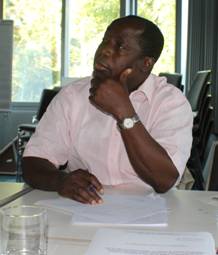
Professor Dr. R. A. Alabi, Ekpoma, Nigeria
A study on An Analysis of the Impact of Foreign Aid on Nigeria: A Dynamic Specification is under Review and will then also be published in the Blue Series Discussion Papers of IWIM.
This was the title of a presentation by Dr. Ubaydulla S. Nadirkhanov, a Postdoc Researcher from the Institute of Economy, Academy of Sciences of the Republic Uzbekistan, Tashkent (see the paper by the author). Obviously Uzbekistan is following a foreign investment strategy so as to modernize and diversify the economy. New trends and policy implications were presented and discussed.
Dr. Nadirkhanov is a senior guest researcher at the University of Bremen (Faculty of Economics, Research Group Professor Sell), and the research scholarship was financed by the DAAD.
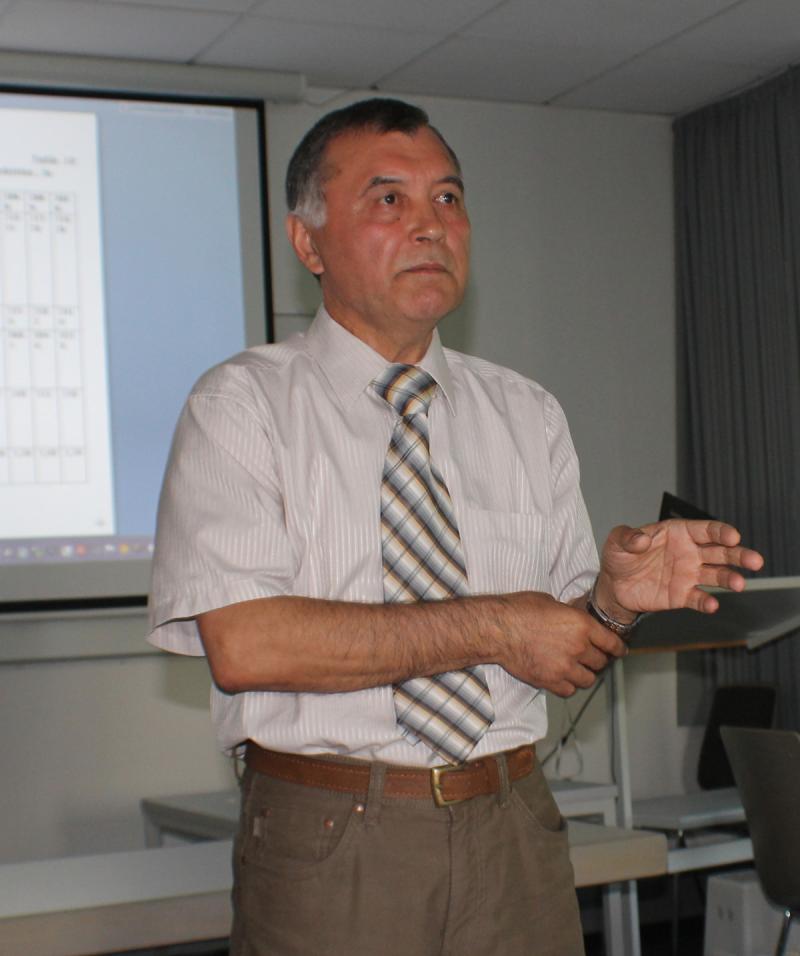
Dr. Nadirkhanov during his presentation
Professor Dr. R. A. Alabi from Ekpoma, Nigeria (Alexander von Humboldt Research Fellow, Second Term), cooperating with the Research Group on African Development Perspectives (directed by Professor Karl Wohlmuth) and Dr. U. Nadirkhanov from Tashkent, Uzbekistan (DAAD Research Fellow, Second Term), cooperating with the Research Group on Eastern Europe (directed by Professor Axel Sell) will present their research findings on Wednesday, 15 August, 2012, 16-18 p.m. in the University of Bremen, Building WHS 5, Room 0.13. At 18.00 p.m. the Press is invited to interview the two researchers on their scientific work and on the conditions and developments in Nigeria and in Uzbekistan. The Full Programme with Abstracts of the Lectures is ready for download (Full Programme and Abstracts).
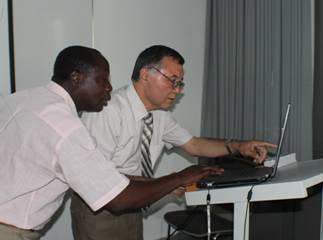
Our International Research Fellows Professor Alabi from Nigeria and Dr Nadirkhanov from Uzbekistan prepare for their presentations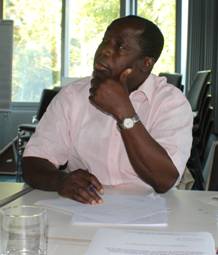
Professor Alabi is listening to the statements and presentations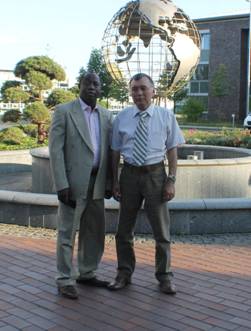
Professor Alabi and Dr. Nadirkhanov after their presentations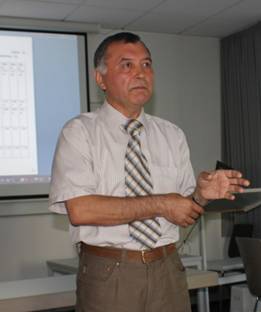
Dr. Nadirkhanov praises the activities of IWIM which was founded 25 years ago in August 1987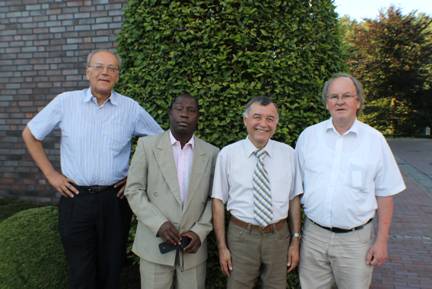
The research supervisors Professor Wohlmuth and Professor Sell with their international guests after the closure of the workshop
The presentations and/or the papers will be revised by the authors and will then be made public in due time.
It was agreed to continue the research cooperation between the research groups at the University of Bremen and the partner university institutions in Nigeria and Uzbekistan, and it was also agreed to extend the cooperation to younger researchers in Nigeria and Uzbekistan.
Professor Axel Sell (from the Working Group Eastern Europe) and Professor Karl Wohlmuth (from the Working Group African Development Perspectives) jointly invite to a Research Workshop on August 15, 2012 at the University of Bremen in Building WHS 5, Room 0.13, at 16-18 p.m.
Two Senior Research Scholars will report on their researches:
Professor Dr. Reuben A. Alabi from the Department of Agricultural Economics, Ambrose Alli University, Ekpoma, Edo State, Nigeria is an Alexander von Humboldt Research Fellow and Dr. Ubaydulla Nadirkhanov from the Tashkent State Institute for Oriental Studies is a DAAD Research Fellow.
Programme of the Workshop on August 15, 2012, 16-18 p.m. in WHS 5, Room 0.13:
Introduction: Professors Axel Sell and Karl Wohlmuth
Lecture and Discussion: The Aid-Growth Link in Sub-Saharan Africa. The Case of Nigeria, Presentation by Professor Alabi
Lecture and Discussion: Direct Investment in a Resource-rich Transition Economy. The Case of Uzbekistan, Presentation by Dr. Nadirkhanov
Final Discussion: Can the two Country Cases be compared?
Conclusions: Professors Axel Sell and Karl Wohlmuth
Participation: is for the public possible free of charge, but a notification is requested at: iwimsek@uni-bremen.de or at: wohlmuth@uni-bremen.de or at: sell@uni-bremen.de
As IWIM was founded in August 1987 this event is also a good opportunity to think about the research work of the past 25 years and about future tasks.
University of Bremen is excellent: "As one of eleven Universities of Excellence in Germany, the University of Bremen receives a funding of almost 100 Million Euro over the next five years. How does the university benefit from this? How do the students as well as the state of Bremen benefit from this award? The movie "University of Bremen - now University of Excellence" finds answers to these questions" (Link to the University Homepage: http://www.uni-bremen.de/en/university/exzellenzinitiative.html?cHash=7db4e3ab5ed916b2621b54067ca000c5).
Universität Bremen ist exzellent: Der Rektor informierte die Professoren über die Möglichkeiten, die dieser Erfolg der Universität Bremen für Forschungsanträge aus Mitteln der Exzellenzinitiative bietet (Link zu dem Schreiben des Rektors).



